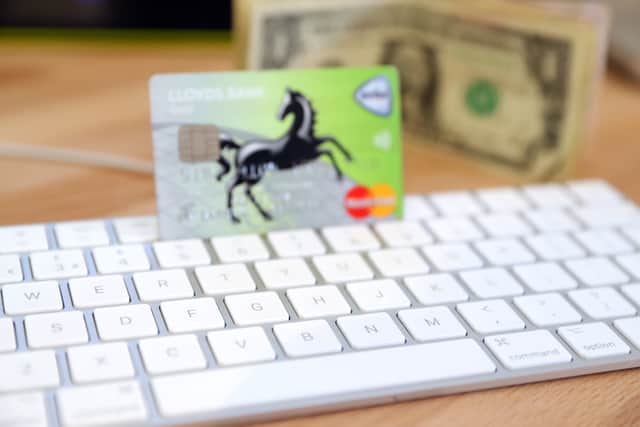Travel scam warning: Lloyds Bank warns UK holidaymakers of fake flight scams and dead-end destinations with victims losing over £700 - how to avoid
and live on Freeview channel 276
Lloyds Bank has issued a travel warning to UK holidaymakers as they could fall victim to a scam when booking a trip. These scams have risen 7% over the past year, with people losing £765 on average, with those aged 35 to 44, often booking trips for their families, making up over a quarter of victims.
Facebook, including Facebook Marketplace, is the main hunting ground for fraudsters, with nearly half of holiday scams starting on the platform. Fraudsters are also using legitimate booking sites to draw victims in.
Advertisement
Hide AdAdvertisement
Hide AdPlane tickets are the most common "fake" item sold relating to holidays. Scammers will create fake adverts for cheap flight deals or lure unsuspecting victims by pretending to sell airline tickets they can no longer use themselves.
They will offer a low price and ask for a fee to change the name on the ticket. Once the money has been sent, the scammer will disappear, leaving the victim out of pocket – and without a ticket.
The bank suggested that increased flight costs post-pandemic have led holidaymakers to turn to social media and lesser-known websites in search of cheaper deals. After fake flights, the offer of caravans for sale is the next most commonly reported fake item relating to holidays.


Victims are offered a cheap price for a motorhome or static caravan, but may be looking at photos of a vehicle that has been copied from elsewhere online. Scammers will also list fictional holiday rentals with doctored photos or images stolen from other listings.
Advertisement
Hide AdAdvertisement
Hide AdThey may catch holidaymakers out by taking a deposit through a legitimate website but then asking for further payments offline, for example by bank transfer. Once the payment has been given, the scammer disappears.
While most holiday scams start on Facebook (including Marketplace), Lloyds Bank warns that they can also happen through more trusted websites such as Airbnb and Booking.com. Fraudsters have been able to compromise the Booking.com mobile app, using it to successfully message holiday makers posing as a booked hotel.
While pretending to be the hotel, the scammer will ask for a further payment, to be sent in a different way to the original booking, or for card, bank account or other personal information. It’s a sophisticated and layered scam as it appears to be a message from the genuine hotel, sent through the actual Booking.com app. In many cases, victims don’t realise they’ve been scammed until much later.
Fraud prevention director at Lloyds Bank Liz Ziegler told UK holidaymakers: "Always take the time to think about purchases you make online, and when in doubt, always book through a trusted retailer. When it comes to booking stays, always use your card and don’t be fooled by hosts asking you to ignore the website’s rules and transfer money directly to them."
Advertisement
Hide AdAdvertisement
Hide AdAirbnb has teamed up with online safety experts Get Safe Online to help protect people, adding that it has safeguards in place to help protect stays booked on its website. The website encourages holidaymakers to report suspicious websites or phishing emails to Airbnb for investigation.
General manager for the UK and Northern Europe, Airbnb, Amanda Cupples, said: "As people take advantage of the upcoming bank holidays, travellers should remain vigilant when browsing for their trips online and book directly with trusted providers. We encourage all of our guests to book, communicate and pay for their stay on the Airbnb platform, where we have secure processes and support measures like AirCover in place to help keep our community safe."
Listed below are Lloyds Bank's tips to stay safe from holiday scams.
1. Buy tickets and hotel stays from trusted retailers or directly from the airline or hotels. Look for valid reviews on websites such as Tripadvisor.
Advertisement
Hide AdAdvertisement
Hide Ad2. Paying by card can give added protections if something goes wrong.
3. Pay through booking websites’ own systems. If you are booking a hotel through a third party and receive what looks to be a message from a hotel asking for more money after the original booking has been confirmed, do not pay this without contacting the website or the hotel directly. Ensure you use the contact details on their websites.
4. Be cautious on social media. If you are looking for a caravan or motorhome, always see the item in person before handing over money.
5. Be wary of a seller who is trying to rush or bombard you.
6. Be cautious about warnings from your bank. Your bank is likely to provide a warning when you set up a new payee or make an unusual payment. Make sure you heed any advice provided.
Comment Guidelines
National World encourages reader discussion on our stories. User feedback, insights and back-and-forth exchanges add a rich layer of context to reporting. Please review our Community Guidelines before commenting.
